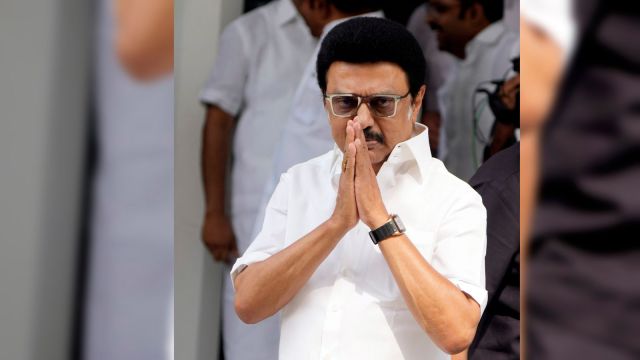Tamil Nadu parties oppose delimitation: Freeze 1971 Census as basis for 30 more years
Tamil Nadu CM seeks to broaden fight to other southern states, says delimitation will ‘weaken’ Tamil Nadu and be a ‘threat to India’s federal structure’
 The all-party meeting has also resolved that the freeze on delimitation based on the 1971 population census, “which extends until 2026, should be extended for the foreseeable future”.
The all-party meeting has also resolved that the freeze on delimitation based on the 1971 population census, “which extends until 2026, should be extended for the foreseeable future”. IN A rare display of unity, most political parties across Tamil Nadu came together for an all-party meeting called by Chief Minister M K Stalin at the State Secretariat on Wednesday to oppose the delimitation of Parliamentary constituencies, which is due in 2026.
In a six-point resolution, the parties asked the Centre to extend the 1971 Census-based delimitation framework for another 30 years beyond 2026, to ensure fair representation for states that have effectively controlled their population. It is unjust to reduce Tamil Nadu’s parliamentary representation only because it has effectively implemented population control measures in the national interest, the resolution said.
Besides underlining that there should not be any reduction in the number of Lok Sabha seats, the meeting also called for a Joint Action Committee (JAC) comprising MPs from Tamil Nadu and other southern states to raise awareness and coordinate efforts in the “fight against delimitation”.
Besides the ruling DMK, the Congress, AIADMK, Left parties, Viduthalai Chiruthaigal Katchi and the Tamilaga Vetri Kazhagam also attended the meeting. The BJP, Naam Tamilar Katchi and Tamil Maanila Congress stayed away.
“The sword of delimitation is hanging over South India,” Stalin said in his opening remarks. “Tamil Nadu is going to be severely affected by this… It will suppress Tamil Nadu’s voice in the national political arena,” he said, adding that such an approach would “punish Tamil Nadu for successfully implementing population control measures and contributing significantly to national development.”
Recalling that then Prime Minister A B Vajpayee had assured Parliament in 2000 that the 1971 Census would be used as the basis for delimitation until at least 2026, Stalin proposed that the “status quo should continue for at least three decades”, until 2056. He said the proposed delimitation was a “direct attack on Tamil Nadu’s political representation in India’s democracy”.
“If parliamentary, legislative and Rajya Sabha seats are reduced based on population, it would amount to penalising the southern states, particularly Tamil Nadu, for implementing successful socio-economic welfare schemes over the past five decades,” Stalin said.
He called on all parties in the state to stand united on the issue, warning that the loss of seats would have lasting repercussions on Tamil Nadu’s ability to assert its rights at the national level. “If the Union Government refuses to acknowledge the concerns raised by our 39 MPs today, imagine the consequences if that number is reduced even further… It would result in irreversible injustice to Tamil Nadu,” he said. He said his government would take “all measures to prevent implementation of delimitation”.
The resolution echoed these views. Delimitation will “weaken” Tamil Nadu and be a “threat to India’s federal structure”, it said. Saying that delimitation based “exclusively” on population figures will affect “the political representation rights of Tamil Nadu and other South Indian states,” it said: “It is entirely unjustifiable to reduce parliamentary representation of Tamil Nadu and other South Indian states solely because they have proactively implemented population control measures in the national interest.”
The resolution demanded that if the total number of Lok Sabha seats is increased, Tamil Nadu must receive a proportionate increase in constituencies based on the 1971 Census. While stating that Tamil Nadu is not against delimitation in principle, it demanded a clear constitutional amendment ensuring that southern states are not unfairly penalised in the seat redistribution process.
At the meeting, several leaders expressed their consensus on the decision to oppose delimitation. Representing AIADMK, former minister D Jayakumar said, “Parliamentary seats of Tamil Nadu should be preserved for equal representation of people of Tamil Nadu. AIADMK has always stood against delimitation based on population, and we are still standing for the same cause.”
Actor-turned-politician Kamal Haasan said delimitation affects all southern states. He said that the BJP “wants to create Hindia”, a jibe targeting the Centre’s insistence that Tamil Nadu should implement the three-language formula.
According to several parties, including the DMK, the three-language formula would “impose Hindi” on Tamil students who currently study just two languages – Tamil and English.
While VCK leader Thol Thirumavalavan spoke in support of delimitation, he said a “status quo should continue based on 1971 Census”. He taunted the state BJP unit and said the party should have joined the meeting if they had “any concern for the people of Tamil Nadu”.
Meanwhile, the state BJP, led by state president K Annamalai, called the meeting “funny”. “The fear of delimitation affecting the southern states is imaginary,” Annamalai said.
Earlier, Union Home Minister Amit Shah had said that the southern states, including Tamil Nadu, would not lose a single Parliamentary seat on account of delimitation.







